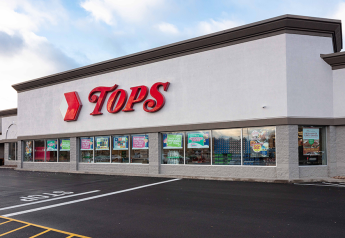Quebec’s family farms handle cold, wet late season together
SHERRINGTON, Quebec — Just like the U.S. Northeast produce industry, Quebec is dominated by many multigenerational family farms dealing with a cold, rainy spring that delayed planting season.
As Yannick Guérin, 31, wound through crates, boxes, bags and belts of pink radishes at his family’s radish packing warehouse, the third-generation grower and salesman at Sherrington-based Les Jardins A. Guérin & Fils said planting normally starts in mid-April.
But this year, it was one week late because of the cold.
And that wasn’t so bad, after all.
“Here, with the black soil, it helps them retain moisture and the taste is less strong,” he said.
“When the weather is hotter at the beginning of growing, the radishes get spicier.”
Consumers like milder-tasting radishes, which comprise 60% of their business, with carrots and onions making up the rest, Guérin said.
The company produces 52% of Quebec’s radishes, he said.
In late June, a line of field workers leaned over the black-dirt rows of lettuce as they weeded by hand at one of Vegpro International’s farms, also in Sherrington.
Because of the early rain, a normal week of planting was done in 1.5 days when there was a rain-free window, said François Van Winden, who runs Vegpro International with his father, Gerry Van Winden.
One of the province’s largest lettuce growers, Vegpro International has four farms in Quebec, plus fields and packinghouses in Florida and British Columbia.
“The soil was too wet. So, when it dries, it gets too compact and stresses roots. The lettuces didn’t grow high and fast enough to block the sun from the weeds, so the weeds grew more,” François Van Winden said.
In Napierville, Stéphane Van Winden’s Delfland farm grows 1,200 acres of vegetables: romaine, iceberg, carrots, onions, shallots, and radishes such as daikon and lo bok.
Because of the late start, he’s adjusted varieties planted at the end of season to be the quickest-growing varieties. The first plantings are the longest-growing and stay well in storage.
Shallots will be plucked by the end of August or in September, lay in the field for at least a week and then continue drying in storage.
Delfland will harvest daikon from June 25 to Oct. 15-20.
Lettuces comprise about 500 acres, or 40%, of what the company grows, and 60% to 70% of it is exported to the U.S., particularly the Northeast, he said.
Because of the cold, wet April, planting cabbage and carrots at Ferme A. & R. Turcot in Saint-Roch-de-l’Achigan was delayed until May 5 and finished by the end of May, said Pierre-Luc Turcot, who runs the farm with family.
The first carrots should be ready in early August. The crop usually lasts through the end of July the following year because they keep so well in storage.
But this time, carrots may last an extra month because of the late start.
Customers are asking the Turcots for a year-round supply, so Pierre-Luc said they’re looking to import carrots from Florida and Georgia, and then pack them at their Quebec packing house, where they bought new equipment.
The early season rains delayed St-Lin Des Laurentides-based Ferme GNC’s crops a week or two, said Guillaume Henri, vice president of sales and marketing.
“But we’ll probably have more yields than last season. We don’t know for sure yet. The bad part of it is we’ll all be delayed and go at the same time,” he said.
Ferme GNC grows beets, garlic, cabbage, carrot, celery root, garlic scapes, parsnips, rutabaga, squash, white turnips on 600-750 acres, selling them coast to coast in Cananda and the U.S.
How Quebec compares
Quebec isn’t Canada’s biggest fresh-produce province, but it’s right up there.
“The Sherrington area is known as the Gardens of Quebec for the muck soil, or black earth, where many vegetables are grown,” said Jocelyn St.-Denis, executive director of the Quebec Produce Growers Association.
Members represent 80% of Quebec’s produce, St.-Denis said.
With 1,172 vegetable field farms in 2016, Quebec was the second-largest producing province, accounting for 38% of Canada’s total production of field vegetables, according to the Canadian agriculture department’s 2017 statistical overview of the Canadian vegetable industry, the latest report available.
Ontario produces 44% of the country’s vegetables.
With 1,495 fruit farms in 2016, Quebec also ranked second in the country, preceded by British Columbia, and followed closely by Ontario, according to the report.
Those government reports also showed that the Canadian greenhouse vegetable sector is the largest and fastest growing segment of Canadian horticulture — but in 2017, Quebec ranked third in that kind of production at 6% of total production, compared to Ontario’s 69% and British Columbia’s 19%.
In all, about 535,000 tons of fresh vegetables are grown yearly, resulting in about $360 million in farm cash receipts, making Quebec the country’s second largest producer, according to the Quebec Produce Growers Association website.
From 2003 to 2013, horticultural production grew by 57%, which was 1.5 times greater than the 39% growth rate posted for the entire agricultural industry, according to the association.
Sweet corn, green peas, carrots, green or wax beans, tomatoes, dry onions, cabbage, broccoli, lettuce and pumpkins were the top 10 vegetable commodities planted in those fields, according to the agriculture department’s report.
Competing yet cooperating
To combat issues like this year’s cold, rainy spring during planting time, several of these farms are in Groupe Vegco, a cooperative of 12 growers who’ve been working the land for more than 50 years.
“We believe if everyone works together, we can get a better price. It’s a mindset. We are more ‘I could help my neighbor. If they do better, I could do better,’” said Jean-Bernard Van Winden as he walked through rows of romaine with his son, Marc-André, at their Napierville-based Les Fermes Hotte and Van Winden.
Half of their 780-acre farm is iceberg and romaine lettuce, a fourth is onions and the last fourth is bok choy, napa cabbage, yellow beets and celeriac.
Case in point: In 2017, a hail storm in Sherrington dumped 6.2 inches of rain in 23 hours, but those affected were helped by others in the cooperative, said Stéphane Van Winden of Delfland in Napierville.
“By being in a group, we were able to sell their product first because it wouldn’t keep well and save the product from other farms. It’s good to have a group because it could happen to anybody. There’s a lot of give and take,” Van Winden said.







